Circulate!
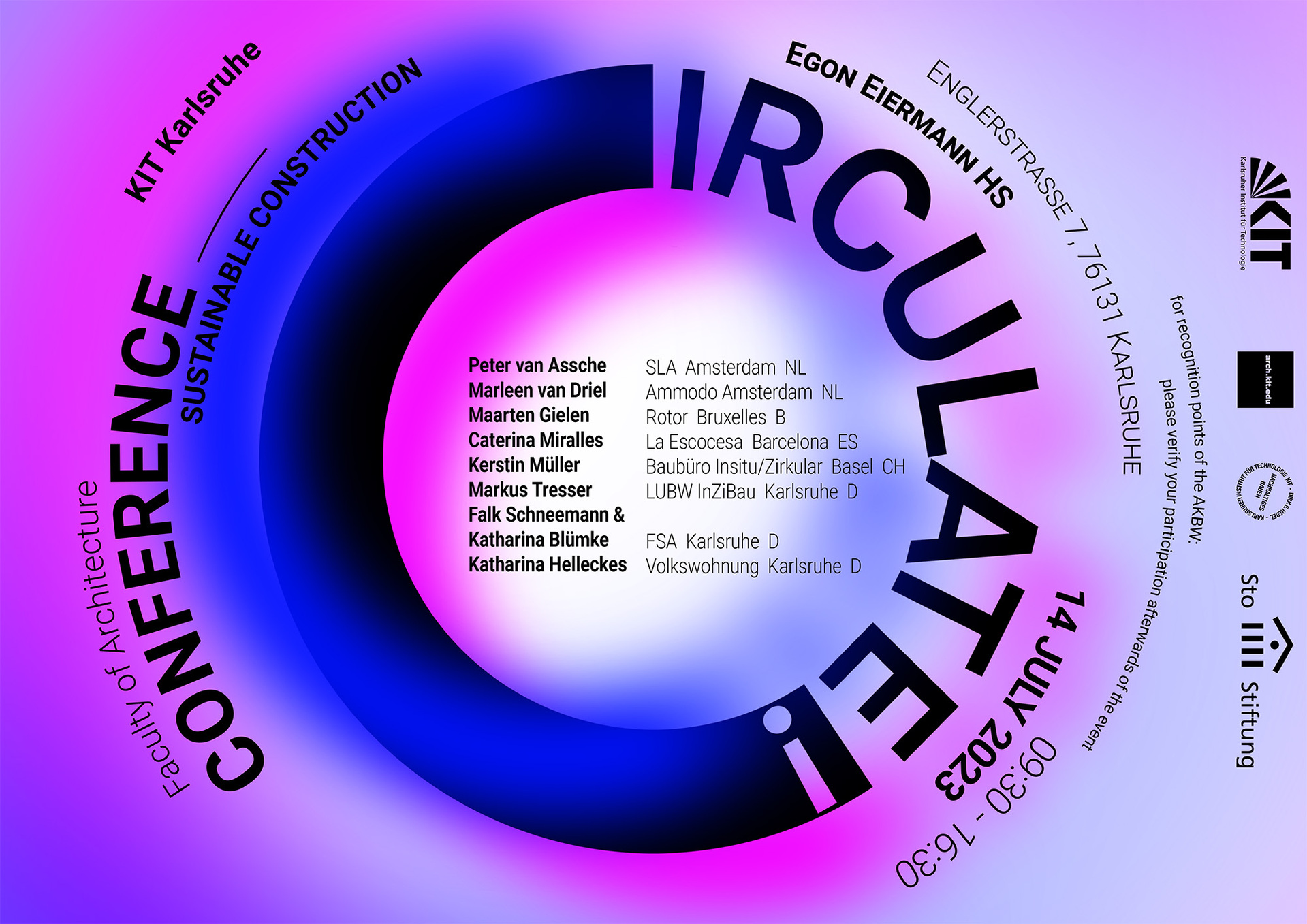
Die eintägige Konferenz „Circulate!“ thematisiert die Kreislaufwirtschaft im Bauwesen, ihre Chancen und Herausforderungen und bildet den offiziellen Abschluss des Programms im Rahmen der Sto-Gastprofessuren am KIT zum Thema „Sustainable Materials for a new Architectural Practice – Entering a circular economy“. Die Gastprofessor*innen widmeten sich der Frage, wie wir in Zeiten des Klimawandels und einer immer spürbar werdenden Ressourcenknappheit durch sortenreine Entwurfsplanung, einen vorausschauenden Umgang mit Materialien und der Idee des Urban Mining verantwortungsvoll beim Bauen mit unseren natürlichen Ressourcen umgehen können.
Die Konferenz bietet eine Plattform, um unterschiedliche Perspektiven zum Thema Kreislaufwirtschaft im Bauwesen aus Belgien, den Niederlanden, der Schweiz und Deutschland zu diskutieren. Drei Teams haben im Rahmen der STO-Gastprofessuren in den vergangenen Semestern an der KIT Fakultät für Architektur Entwurfsstudios und Seminare zu diesem Themenkomplex unterrichtet und neue Themenkomplexe im Bereich einer kreislaufgerechten Architekturpraxis mit der Studierenden diskutiert. Unterrichtet haben Maarten Gielen von RotorDC in Brüssel in Kooperation mit Prof. Dr. Anupama Kundoo von Anupama Kundoo architects, Pune und Berlin. Zudem lehrten Kerstin Müller mit Oliver Seidel von Zirkular / baubüro in situ, Basel, sowie Peter van Assche mit Katja Hogenboom von bureau SLA, Amsterdam.
Gäste aus Verwaltung, Politik und Praxis aus den verschiedenen Ländern und deren Rahmensetzungen zum Thema Kreislaufwirtschaft werden die Konferenz mit Beiträgen erweitern. Welche Herausforderungen der Kreislaufwirtschaft hinsichtlich planungsrechtlicher Vorgaben bestehen im Bauwesen und wie können diese überwunden werden? Welche praktischen und rechtlichen Hürden gibt es beim Einsatz von wiederverwendeten Bauteilen und Materialien? Und welche Schritte müssten unternommen werden, um das Kreislaufgerechte Bauen zeitnah als Standard in der Praxis einzuführen, wie von der EU verlangt?
Prof. Dirk E. Hebel, Professor für Nachhaltiges Bauen und Dekan der KIT-Fakultät für Architektur, wird durch die Veranstaltung führen.
Weitere Informationen
Zeit und Ort
14.07.2023, 9:30 bis 16:30 Uhr
KIT-Fakultät für Architektur
Englerstrasse 7
76131 Karlsruhe
Egon-Eiermann-Hörsaal (HS16)
Die Veranstaltung wird nicht gestreamt.
Teilnahme
Der Eintritt ist frei. Eine Anmeldung ist nicht erforderlich.
Fortbildung
Die Veranstaltung ist als Weiterbildungsveranstaltung der Architekt*innenkammer Baden-Württemberg im Umfang von 4 Stunden anerkannt.
Sprache
Die Veranstaltung findet in englischer Sprache statt.
Förderung
Die Veranstaltung wird durch die großzügige Unterstützung der Sto-Stiftung ermöglicht.
Programm
09:00 Uhr
Zulassung und Anmeldung
09.30 Uhr
Begrüßung und Einführung
Dirk E. Hebel, Dekan der Fakultät für Architektur, KIT Karlsruhe
09:45 Uhr
Heroic attempts to start from scratch – Research by design explores the construction methods of tomorrow
Peter van Assche
Prof. | Gründer des Bureau SLA, Amsterdam | Professor für Architektur & Circular Thinking, Universität der Künste Amsterdam
https://bureausla.nl
The transition towards a more regenerative construction practice requires not just technical innovations, but also a fundamental shift in the system logic on which architects and engineers rely. It is therefore not just an environmental, technical or economic project: it needs to be a cultural recalibration. Or, as some might say: a cultural revolution. To achieve a fundamental shift it is necessary to explore new modes of thinking. In recent years we have, with students, begun to explore radical design strategies that anticipate the world of tomorrow. These strategies contribute - each from their given perspective - to a building practice that is truly regenerative. In his talk, Peter van Assche will sketch the outlines of the regenerative cultural revolution, show the potential of design research in education, and present some of the answers that the design projects have to offer.
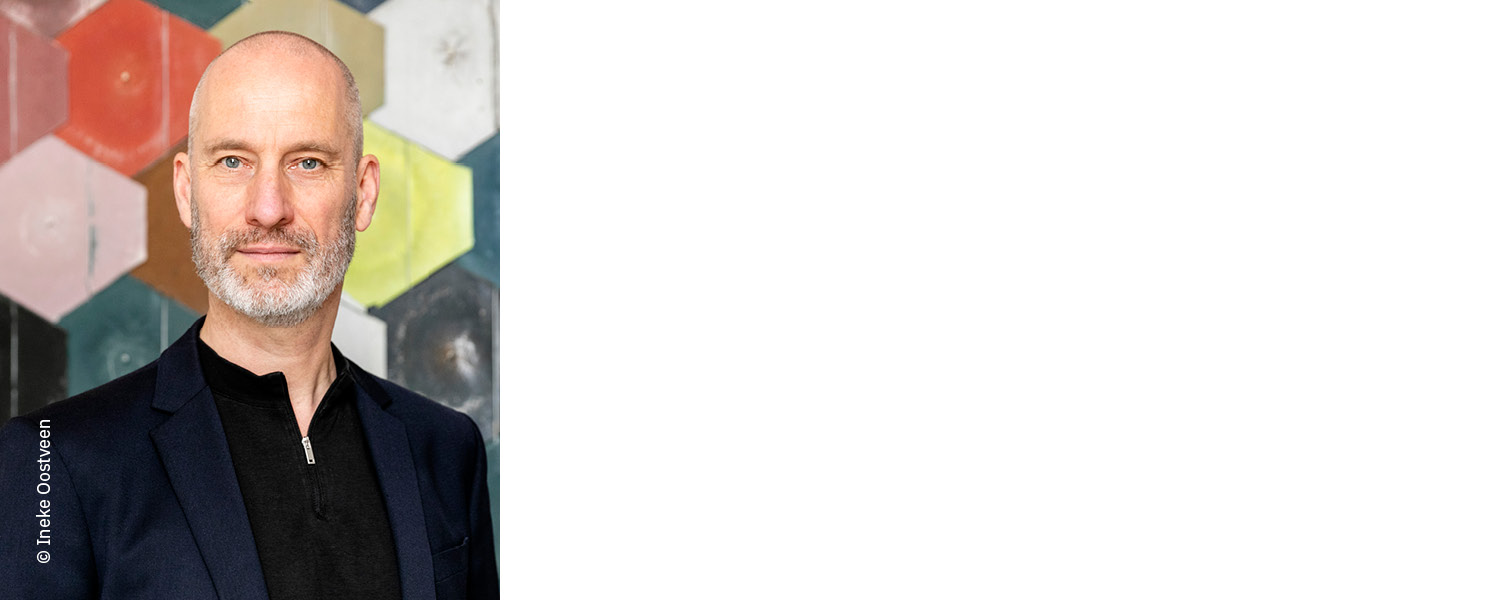
After beginning his career in science and experimental mathematics, Peter van Assche transitioned into architecture and is now the founding principal of bureau SLA, an Amsterdam-based firm focused on the necessity of transitioning to a circular economy through design. As a design studio, bureau SLA consists of a team of architects and builders, supported by architectural historians, landscape architects, and energy experts. The studio does not wait for commissions to be given but builds and develops in the city in an innovative way — from their own initiatives and with their own manpower. By designing, researching, inventing, and building the full potential of material use, energy, waste flows, smart living & working and development processes are discovered - and realised.
Peter van Assche is professor Architecture and Circular Thinking at the Academy of Architecture Amsterdam, and supervisor for the Utrecht station area. He received a Master of Information Technology (cum laude) from the Technical University Eindhoven and obtained his architecture degree from the Rotterdam Academy of Architecture. He was visiting professor in Erfurt (2019), at Cornell University (2020, 2022), and at the Karlsruhe Institute of Technology (2022, 2023).
10:10 Uhr
Building for change - Turning research into reality
Marleen van Driel
M. Sc. Architektur | Programm Expertin Architecture bei Ammodo, Amsterdam
https://www.ammodo.org
The promises presented by a new building culture are significant. Through knowledge, research, innovation, and projects, the potential for creating architecture that supports a circular future is convincingly demonstrated. However, the implementation and scaling up of these practices in real-world applications is lagging behind, resulting in a limited number of circular buildings. As a practicing architect, it is difficult to implement these new practice within the existing system. Additionally, it is crucial to support pioneers who possess the capability to build for the future. Marleen van Driel, an architect and head of the architecture program for Ammodo, is actively working towards driving a new building culture. In her talk, she provides valuable insights into the trade-offs involved in an ambitious architecture program that aims to highlight crucial projects and architects who prioritize respect for people, location, local climate, -materials, and history. This program aims to provide a larger platform for these architects and their projects.
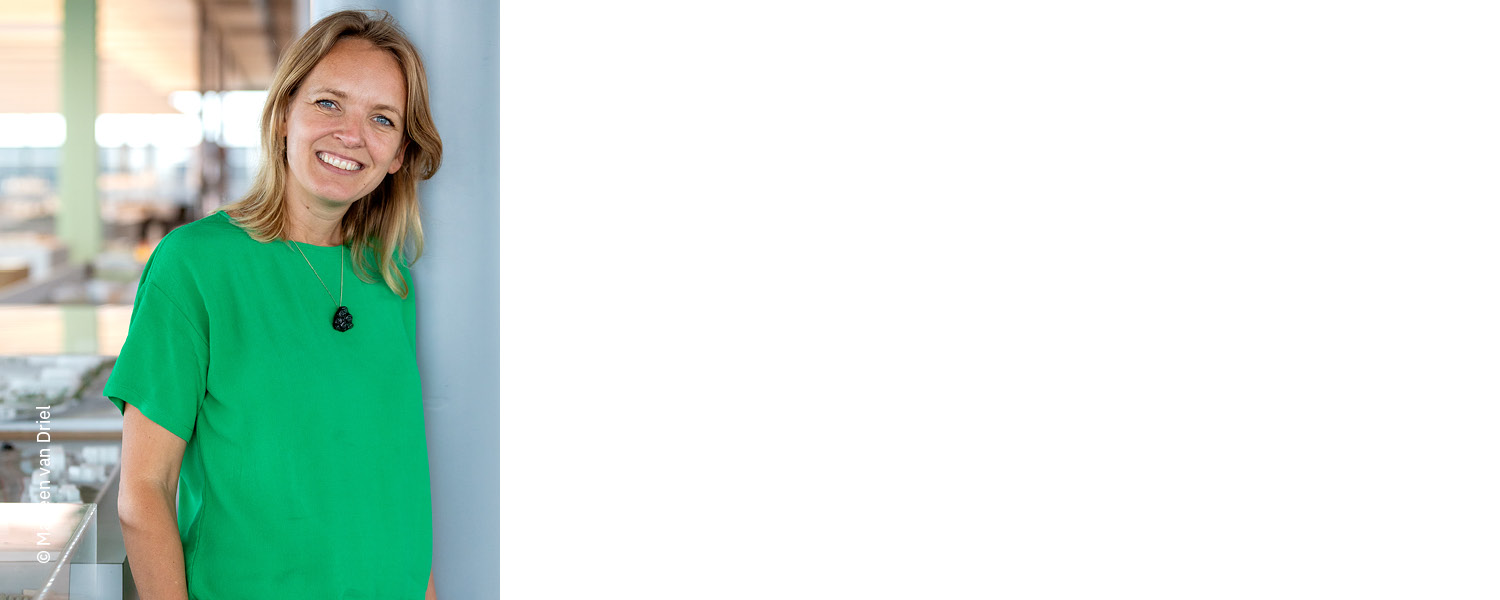
Marleen van Driel works as an architect focused on nature-based solutions and is head of architecture for the Ammodo Foundation, where she works on an ambitious architectural program that aims to stimulate location-specific, exemplary architecture with social and ecological responsibility across the globe.
She studied Architecture at the Delft University of Technology in the Netherlands and worked for 11 years on various complex projects at Benthem Crouwel Architects after graduation. She then worked as an Associate Architect Sustainability at the multidisciplinary design office Rijnboutt. Here, she contributed to the integral sustainability within the firm, both in strategy and (research) projects. She worked on the urban densification challenge Merwede in Utrecht, with the aim of improving the living environment for humans and nature.
In addition to her design work, she taught at the TU Delft in the Extreme Architecture design studio and participated in the editorial board for ‘The Green Architecture Guide of Amsterdam 2000-2025.
10:35 Uhr
The 'economy' in circular economy
Maarten Gielen
Designer und Forscher | Mitbegründer von Rotor und Direktor von Rotor DC, Brüssel
https://rotordc.com
Considering that it is today in West Europe significantly cheaper to waste most building materials compared to reusing them, it is clear that the circular economy many aspire to cannot be realised with technological and logistical innovation alone. The framework of our economy is hopelessly outdated, yet it continues to determine what circular practices are considered successful and what others are not. In his intervention, Maarten will show some of the perversities of the circular economy today, and suggests simple ways forward. Perhaps not the abolition of capitalism, but economic reform none the less.
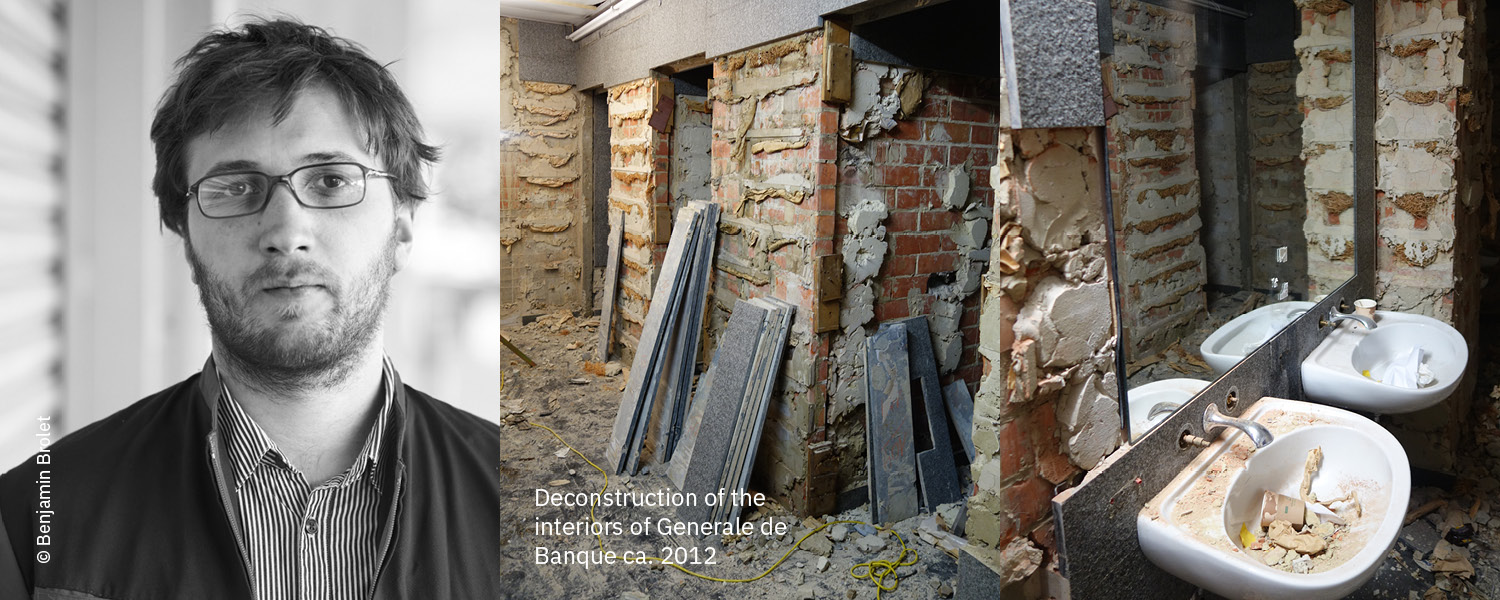
Maarten Gielen co-founded Rotor in 2006, a collaborative design practice with a particular interest in material flows. Maarten played a key role in most exhibitions and publications that Rotor produced before 2015 such as Deutschland Im Herbst (DE, 2008), Usus/Usures for the Belgian pavilion at the 2010 Venice Biennale (IT), Ex-Limbo for the Fondazione Prada in Milan (IT, 2011), OMA/Progress, on the work of OMA/Rem Koolhaas at the Barbican Art Gallery in London (UK, 2011), and Behind the Green Door for the 2013 Oslo Architecture Triennale (NO).
In 2014 he co-initiated Rotor Deconstruction, a company that trades in salvaged building materials. He acted as director of RotorDC till June 2023, growing the company to around 25 employees. For his contribution as an author, designer and projects initiator, Maarten received the Maaskant Prize for Young Architects. He occasionally teaches in various architecture & design schools including HEAD in Geneva, AA in London, the TU in Delft, Karlsruhe Institute of Technology, and Columbia University in New York.
11:00 Uhr
Re-building Barcelona: Work in progress on a method for the reuse of building materials within the public sphere
Caterina Miralles Tagliabue
Barcelona is a city with a strong historical relationship with its architecture and urban planning; from the Eixample project in 1860, the internal relocation of monuments in the Barrio Gòrico, to the renovation of the Olympic Village and the construction of the beach in 1992. Barcelona’s urban history is entangled with the various socio-political and economic changes which shaped, and shaped, the city's current urban landscape. Today, however, the city is facing new challenges - ones that respond to the growing uncertainty of Mediterranean climates and the need to re-visit an urban model historically divorced from non-linear narratives and environmental practices. The underlying slogan behind Barcelona City Council’s current planning model calls for “a plan that responds to the triple crisis we are going through; social, environmental and economic".
In order to adapt and build a resilient urban model which responds to contemporary values, Barcelona’s city hall has launched numerous projects aimed at strengthening the city's commitment to the UN’s Global Sustainable Development Goals; The Superillas (Super Blocks), Eixos Verds (Green Axis) and the project ReUsa (ReUse). Each project calls into question; How can one intervene in a city by building from what is already there? How can circular values be implemented from the remnants of capitalist systems? And what are the human values we must foster?
In an attempt to unravel and expand upon these questions, Caterina Miralles will talk about the urbanism of Barcelona, and its future challenges, through the vector of her experience developing projects for material reuse and participatory design alongside Barcelona’s City Hall and research center La Escocesa. Highlighting the unique issues facing Barcelona as it attempts to address the intrinsic interrelations between its social, environmental, and political ecologies.
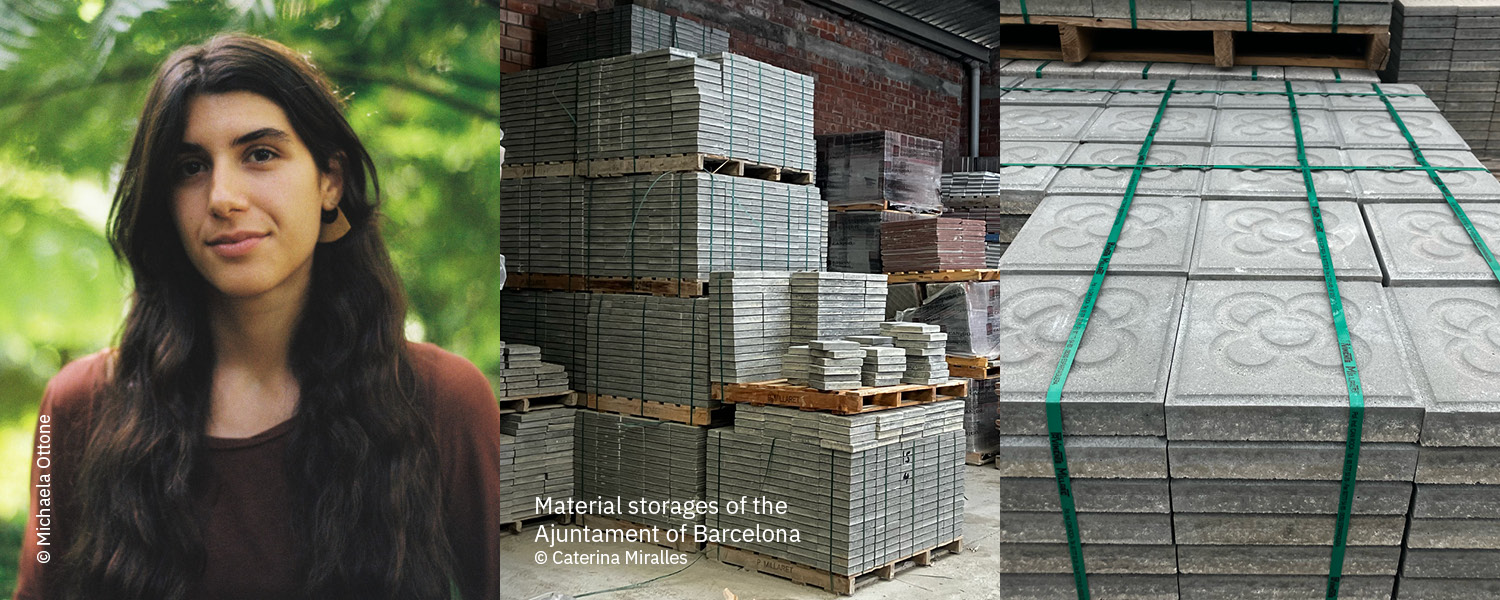
Caterina Miralles is a young architect and multimedia artist. Holding an MA in architecture from the Architectural Association School of Architecture her practice moves between London and Barcelona.
Caterina has led investigation projects focusing on the use of extractive waste in England's quarries and is currently collaborating with the City Hall of Barcelona to generate a system for the reuse of building materials at a municipal scale.
Her work as a co-curator at the Fundació Enric Miralles was focused on her interest in Barcelona’s development through the implementation of divergent design methods, such as non-extractive architecture, and the reutilization of building materials.
Her artistic practice continues to develop via different media including her documentary films, as well as the research she is currently developing as a resident at the center of La Escocesa. Together with local design universities such as the European Institute of Design and the Eina School of Design, she leads teaching courses documenting occupational changes in the city and the implication of design, from object to city scale.
11:25 Uhr
Podiumsdiskussion
Mit Peter van Assche, Marleen van Driel,
Maarten Gielen und Caterina Miralles Tagliabue
Moderation: Dirk E. Hebel
12:05 Uhr
Mittagspause
13:35 Uhr
From practice to teaching. From teaching to practice.
Kerstin Müller
Dipl.-Ing. Architektin | CEO Baubüro in situ AG und Zirkular GmbH, Basel | Klimabeirat l Lörrach
https://zirkular.net
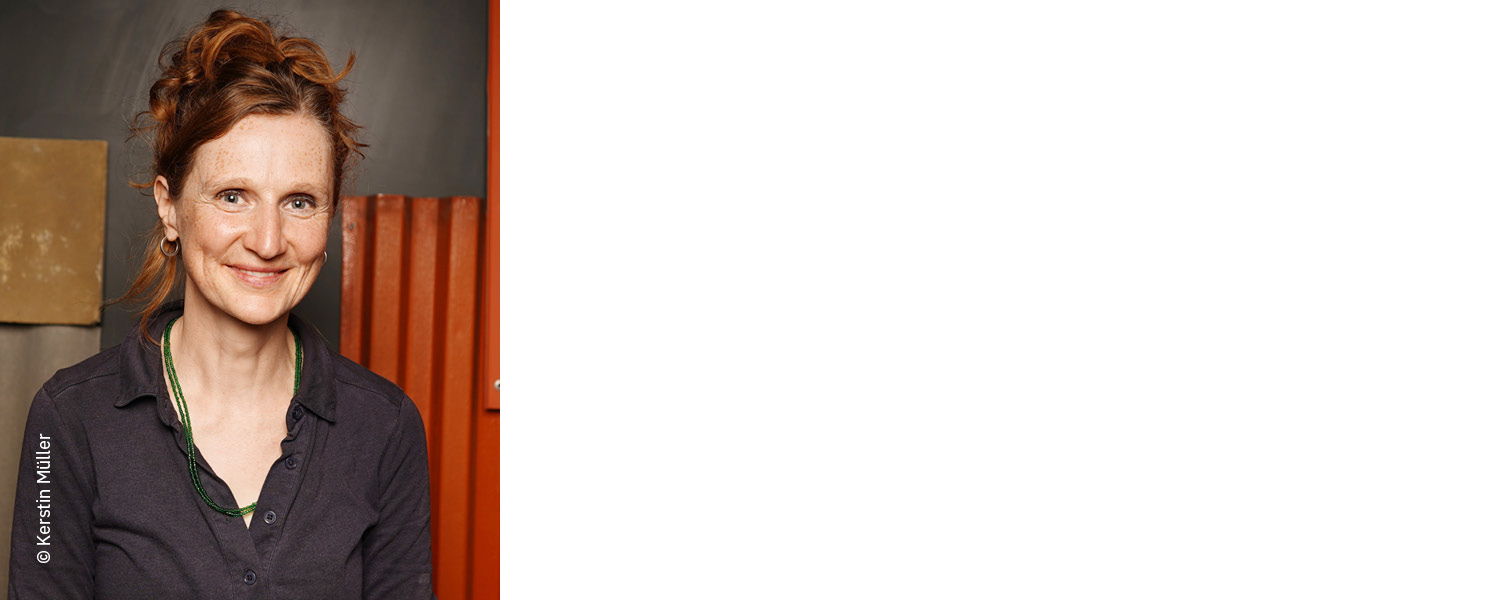
Kerstin Müller ist Dipl.-Ing. Architektin, Fachpartnerin ecobau und GEAK® Expertin. Sie hat an der Universität in Stuttgart, sowie an der École d´Architecture de Lyon, Architektur studiert. In Wien hat sie federführend eine Niedrigenergie-Wohnsiedlung entwickelt und realisiert. Bei ihrem langjährigen Aufenthalt in Vancouver, Kanada hat sie neben ihrer Arbeit als Architektin diverse Weiterbildungen im Nachhaltigkeitsbereich absolviert, anschließend wurde sie GEAK+ Expertin. Seit 2018 leitet sie die Initiative «WohnWandel», die sich für gemeinwohlorientiertes Wohnen in Lörrach und Umgebung einsetzt. Müller arbeitet seit 2013 im Baubüro in situ in Basel als Architektin und Energieexpertin. Ihr Tätigkeitsfeld umfasst Arealentwicklungen, Bestandssanierungen sowie die Betreuung von Pilotprojekten. Eine wichtige Aufgabe ist zudem die Öffentlichkeitsarbeit. Seit 2019 ist sie Mitglied der Geschäftsleitung des Baubüros in situ. 2020 wurde sie zur Co-Präsidentin des Vereins Cirkla Schweiz gewählt, und vertritt zudem die Architektenkammer Baden-Württemberg, Kammergruppe Lörrach im Klimabeirat der Stadt Lörrach.
14:00 Uhr
Circular Construction - The journey from the EU Green Deal to construction practice in the LÄND
Markus Tresser
Dipl.-Ing. Bauningenieur | Leiter des Innovationszentrum Zirkuläres Bauen der Landesanstalt für Umwelt Baden-Württemberg
Insight into the developments of the European framework conditions for circular construction and the potentials and obstacles for implementation in the environment to be built and already built in Baden-Wuerttemberg
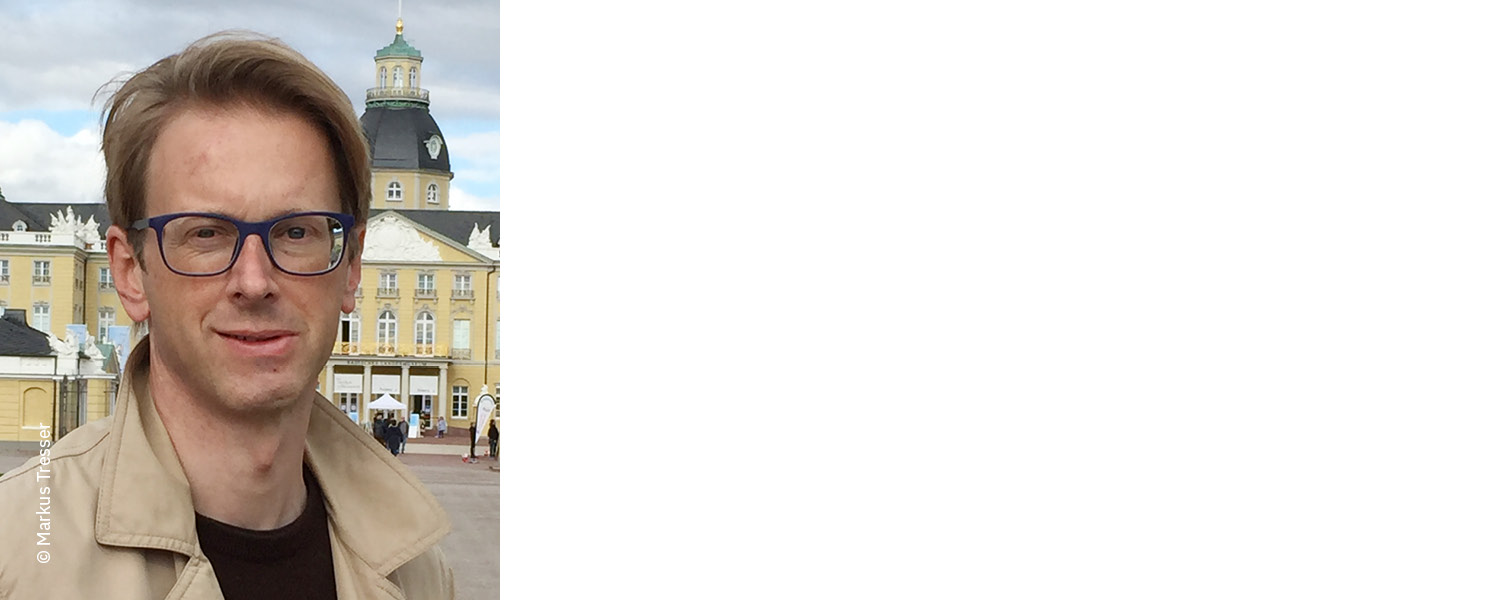
Markus Tresser was born in Trier in 1972. He studied civil engineering at the present KIT. After graduating in 1999, he worked in the field of structural design at KIT and several engineering firms until 2012, including two years at Pell Frischmann in London. In 2012, started working as an inspector for the supervision of manufacturing of construction products and from 2013 first activities in the field of standardization via DIN. In 2019 - 2021, Markus Tresser was co-responsible for the establishment of the Technical Assessment Body (TAB) of the Grand Duchy of Luxembourg as Managing Director. From 2020, further standardization activity followed specifically in the field of "Circular Economy" via ISO and CEN. Since mid-2022, Markus Tresser has been jointly responsible for setting up the "Innovation Center for Circular Construction" at the Baden-Württemberg State Institute for the Environment (LUBW). This sees itself as an information and networking platform to support all those involved in the transformation towards the Circular Economy in the construction sector and to raise awareness of the fact that the Circular Economy does not just start with the demolition of buildings but also with product and building planning.
14.25 Uhr
Garagenaufstockungen – The Project
Garagenaufstockungen – Circular Construction
Falk Schneemann
Dr.-Ing. Architekt | Gründer von Falk Schneemann Architektur, Karlsruhe | Akademische Mitarbeiter am KIT, Entwerfen und Konstruieren
Katharina Blümke
M. Sc. Architektur | Junior Architektin bei Falk Schneemann Architektur, Karlsruhe | Akademische Mitarbeiterin am KIT, Nachhaltiges Bauen
https://www.falk-schneemann.de
Falk Schneemann will talk about the project history from the first sketches for an ideas-competition to the execution of the project with the Volkswohnung as a client. He will discuss the architectonic concept and give an answer to the question why the Garagenaufstockungen are relocatable.
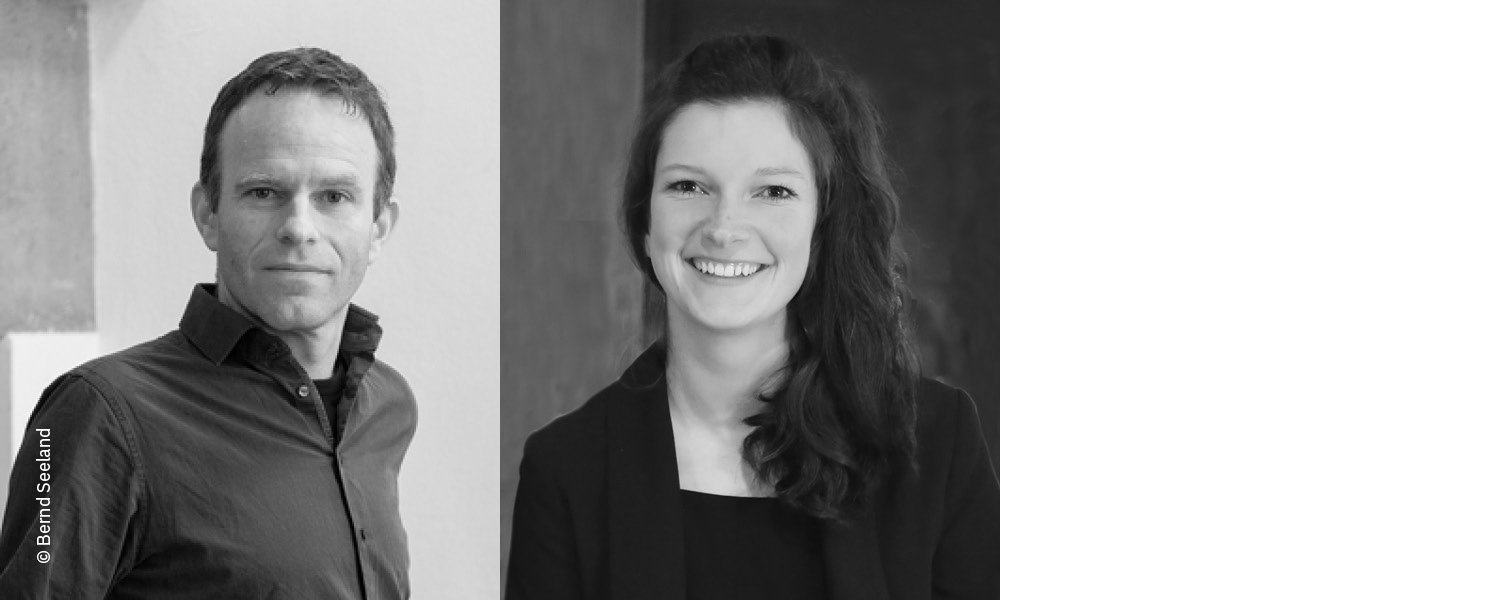
Falk Schneemann completed a training as a carpenter and received his diploma from the TU Delft faculty of architecture. He worked for Foster + Partners and Herzog & de Meuron before he started teaching at the professorship of Ludwig Wappner at KIT where he also received his Ph.D. (Dr.Ing.). He is currently completing the project “Garagenaufstockungen” with his office, a circular construction which creates 12 apartments on top of existing garages.
14:55 Uhr
Garagenaufstockungen – The Perspective of the Client
Katharina Helleckes
Dipl.-Ing. Architektin | Projektleiterin bei der Volkswohnung, Karlsruhe
https://volkswohnung.de
Katharina Helleckes will discuss the motivation of a client who owns 13.500 apartments to build an experimental project like the Garagenaufstockungen including the circular aspect. She will give an idea of how the circular thought finds it´s way into German housing-industry and which conclusions the Volkswohnung draws out the project by now.

Katharina Helleckes has been working for Volkswohnung Karlsruhe for 20 years and is responsible for the garage extension project as the client's representative in the project development department. After studying in Hanover, Zurich and Stuttgart, she initially worked on competitions in independent offices. She then gained her first building experience both in the construction of existing buildings and in new buildings for kindergartens and schools. After starting a family, she moved to a municipal housing association.
15:05 Uhr
Podiumsdiskussion
Mit Kerstin Müller, Markus Tresser, Falk Schneemann,
Katharina Blümke, Katharina Helleckes
Moderation: Dirk E. Hebel
15.45 Uhr
Schlussworte
Dirk E. Hebel, Dean of the Faculty of Architecture, KIT Karlsruhe
